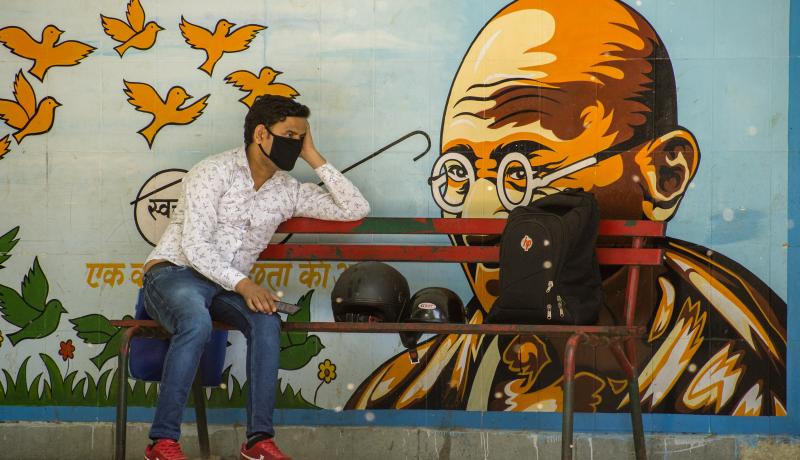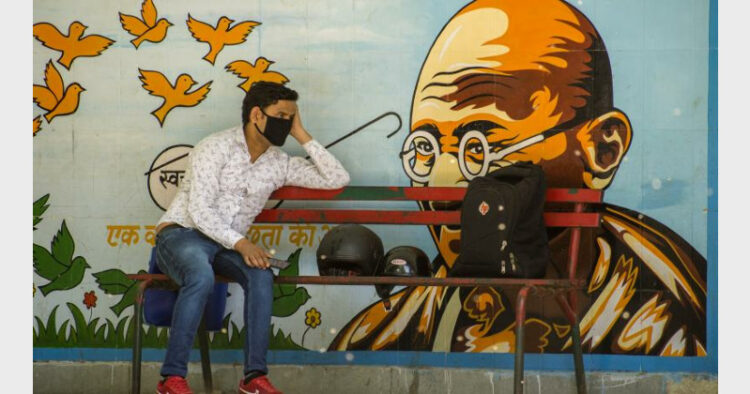
TV Venkateswaran and Jyoti Singh
New Delhi, June 01 (India Science Wire): After seventy days of lockdown, the unlock 1.0 is put into action. Officially designated lockdown 5.0, from June 1, 2020, the economy and ordinary life are returning to normalcy in a controlled and phased manner. This is the beginning of a new normal. It is going to be a long haul. Experts and officials are suggesting that ‘we must learn to live with the virus’. With vaccine still months away, we need to live in a new normal. Speaking to India Science Wire, Prof. K Vijay Raghavan, Principal Scientific Advisor to the Government of India, gave five tips to ‘living with the virus’.
“Either we must change the virus, or we must change ourselves; changing the virus is going to take time,” says Prof. Vijay Raghavan. Research and development of drugs and vaccine are underway, but for them to be available for broader use, after proper clinical trials, is going to take time. Producing the drugs and vaccine for everyone is also time-consuming. Meanwhile, we can change ourselves to face the pandemic.
Here are the five tips from Prof.Raghavan:
1. Wear a mask when you step out of the houses
Recent studies have found that when a person speaks, about 1000 tiny droplets of saliva comes out. If that person happens to be infected with novel coronavirus, then each of these droplets will carry thousands of germs. Large droplets will fall off the ground, usually within one-metre distance. However, the plum of tiny droplets can float in the air for a longer time, mainly if the area is not well ventilated. Many people who are infected by the virus do not show any symptoms. Therefore, they may not even be aware that they are affected. Wearing a mask protectsnot only us but others as well, if we are infected. “We have prepared a handbook on manufacturing homemade mask, which one can use to make their own face cover,” says Prof. Raghavan.
2.Practise vigilant hand hygiene
An analysis of 75,465 COVID-19 cases in China by a WHO-led study shows that novel coronavirus is primarily transmitted between people through respiratory droplets and contact routes. Thus, the COVID-19 virus can be transmitted when one comes into direct contact with infected people. Or when we touch surfaces in the immediate environment or objects used by the infected person (e.g., door handle and washroom tap). Our normal urge is to reach our face. When we wash our hands thoroughly with soap for at least thirty seconds, the virus, if any, on our hands is destroyed. “There are suggestions that the virus may also be transmitted by faecal and oral routes. Hence it is better to wash the hands and legs,” says Prof.Raghavan.
3. Maintain social distance
Most likely, the infection happens through direct contact or inhaling the droplets shed by an infected person. Droplets in usual conditions travel about a metre from the infected person. Keeping a distance of one metre from one another in markets, offices, and public transport would greatly help. “Young people can get infected without showing symptoms, and they can infect the elderly. Hence, we need to take special care to maintain physical distancing, particularly with the vulnerable like elderly, those who are ill in multiple ways,” says Prof.Raghavan.
4. Test and tracking
“If someone turns out to be COVID-19 positive, then one has to go back in time and identify proximal contacts of that person and identify them. We must test them,” says Prof.Raghavan. Only an infected person can transmit the virus to others or contaminate a surface and spread the virus. If most of the infected persons are identified, then controlling the transmission of the virus becomes easy.
5. Isolation
“The people who have been identified as positive cases should be isolated,” says Prof.Raghavan. Once isolated, the infected person can receive proper medical attention. Further, as they remain isolated, an infected person cannot spread the virus to others. The tentacles of the infection can be cut.
“If one can do this with high speed the last one and follow all the others, then we can have a semblance of a normal life while we wait to do something for drugs and vaccine. If we don’t do any of these things and if we slip up on anyone of these, then we will have a problem,” said Prof. Raghavan.
He also pointed out that the conditions are different in India as compared to those in western countries. Physical distancing becomes difficult as many people live in a densely populated area like Dharavi in Mumbai. Further, in India, most households have three generations living together. “This may make the implementation of physical distancing difficult. So, we need to have some innovative solutions to deal with these specific problems,” says Prof. K Vijay Raghavan.
“There are multiple levels of responsibility to decide what to do. Most important of all are communication and putting the message in that communication into action by all of us” Prof K Vijay Raghavan said.
The office of the Principal Scientific Advisor to the Government of India has developed guidelines for hygiene and sanitation in densely populated areas and a manual on homemade protective covers for face and mouth. These are available for free download in many Indian languages in the website http://psa.gov.in/information-related-covid-19.(India Science Wire)














Comments